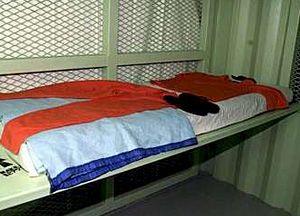 |
 |
 |
 Editorials | Issues | October 2006 Editorials | Issues | October 2006  
Why Do Courts Say "Habeas Corpus"?
 Steve Sampson - KnowledgeNews Steve Sampson - KnowledgeNews


| | "Comfort items" at Guantanamo Bay - habeas corpus not included. |
"The privilege of the writ of habeas corpus shall not be suspended, unless when in cases of rebellion or invasion the public safety may require it."
-U.S. Constitution, Article I, Section 9

U.S. citizens generally regard the Bill of Rights - the first ten amendments to the U.S. Constitution - as freedom's most fundamental guarantee. The Constitution's framers, however, treated habeas corpus as even more fundamental than that. They didn't tack habeas corpus on as an amendment. They wrote it into the Constitution's first article.

Fundamental Freedom

Not without reason. As Alexander Hamilton pointed out in The Federalist, Number 84, "arbitrary imprisonments have been, in all ages, the favorite and most formidable instrument of tyranny." Freedom of speech and religion and all the rest are mere rhetoric if the powers-that-be can lock you up for breathing - or, worse, without naming any charge at all.

The protections of habeas corpus are designed to prevent this sort of tyranny by providing a judicial check on the government's power to imprison. Directly translated, "habeas corpus" means "you have the body." In use, it means something like "show us the body you've got." A writ of habeas corpus amounts to a command from a court that the keeper of a body (a jailor) produce that body (a prisoner) at a particular time for a particular purpose - generally to show just cause for limiting that body's liberty.

Getting Your Day in Court

What's at stake in habeas corpus claims, in most cases, is simply the prisoner's right to have a day in court. It's not about determining guilt or innocence; it's about preventing people from being imprisoned arbitrarily. The prosecution doesn't even have to prove its case (not yet); it merely has to show it has one.

Precursors of today's writs of habeas corpus predate England's Magna Carta (1215), which put limits on royal power. The "Great Charter" itself demanded a similar defense of individual liberty: "No free man may be taken or imprisoned, or ousted of his lands, or outlawed, or banished, or hurt in any way . . . except by lawful judgment of his peers or by the law of the land."

The Court of Last Resort

Today, writs of habeas corpus are most commonly used by prisoners seeking to have convictions in state courts reviewed by federal courts. Generally, such prisoners are expected to exhaust all opportunities for appeal at the state level before petitioning a federal court for a writ. Still, according to the Supreme Court, the writ of habeas corpus remains "the fundamental instrument for safeguarding individual freedom against arbitrary and lawless state action."

Crucial as habeas corpus is, the authors of the Constitution specified two cases in which it can be suspended: rebellion and invasion. Abraham Lincoln relied on the rebellion exception to suspend habeas corpus during the Civil War. The governor of Hawaii relied on the invasion exception to suspend it after Pearl Harbor. | 
 | |
 |



